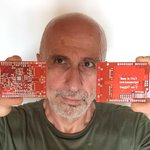EasyCAT LAB - EtherCAT master simple example
Dependencies: SOEM SPI_TFT_ILI9341 TFT_fonts
- This repository contains a simple example for the EasyCAT LAB , a complete educational and experimental EtherCAT® system, composed of one master and two slaves.
- The EasyCAT LAB is provided as a kit by AB&T Tecnologie Informatiche, to allow everybody to have an educational EtherCAT® system up and running in a matter of minutes.
- It uses the SOEM (Simple Open EtherCAT® Master) library by rt-labs, that has been ported in the
 ecosystem by AB&T Tecnologie Informatiche.
ecosystem by AB&T Tecnologie Informatiche.
- The slaves are based on the EasyCAT SHIELD and the Arduino UNO.
Note
- This example uses two LAB 2 slaves.
Note
- In this example only two bytes of data are exchanged between the slaves and are also visualized on the TFT display.
main.cpp
- Committer:
- EasyCAT
- Date:
- 2021-05-07
- Revision:
- 1:385bdd2b4cd6
- Parent:
- 0:13be39911caf
- Child:
- 2:a0e017115fc5
File content as of revision 1:385bdd2b4cd6:
//********************************************************************************************
// *
// This software is distributed as an example, "AS IS", in the hope that it could *
// be useful, WITHOUT ANY WARRANTY of any kind, express or implied, included, but *
// not limited, to the warranties of merchantability, fitness for a particular *
// purpose, and non infringiment. In no event shall the authors be liable for any *
// claim, damages or other liability, arising from, or in connection with this software. *
// *
//********************************************************************************************
// The AB&T EasyCAT LAB is a complete experimental EtherCAT® system, composed by
// one master and two slaves.
// The EasyCAT LAB software is provided free of charge and its pourpose is to allow
// makers and educational institutes to experiment with the EtherCAT® protocol.
//
// The EasyCAT LAB is developed by "AB&T Tecnologie Informatiche" Via dell'About 2A Ivrea Italy.
// www.bausano.net
// www.easycatshield.com
//
// The EasyCAT LAB uses the SOEM library by rt:labs
// https://rt-labs.com/products/soem-ethercat-master-stack/
//
// EtherCAT® is a registered trademark and patented technology, licensed by Beckhoff Automation GmbH.
// www.beckhoff.com
// www.ethercat.org
#define ETH_TXBUFNB 16
#define ETH_RXBUFNB 16
#include "mbed.h"
#ifndef __align
#define __align MBED_ALIGN
#endif
#include "config.h"
#include "SPI_TFT_ILI9341.h"
#include "Arial12x12.h"
#include "Arial24x23.h"
#include "Arial28x28.h"
#include "font_big.h"
#include "soem_start.h"
#define CYCLE_TIME 1000 // master cycle time in uS
// 1000 = 1mS
#define SysMilliS() (uint32_t)Kernel::get_ms_count()
UnbufferedSerial pc(USBTX,USBRX,115200); // set the debug serial line speed to 115200
//---- TFT with resistive touchscreen pins -------------------------------------
// the display used is the SeeedStudio 2.8 inch TFT v2.0
// http://wiki.seeedstudio.com/2.8inch_TFT_Touch_Shield_v2.0/
#define PIN_YP A3 // resistive touchscreen
#define PIN_YM A1 //
#define PIN_XM A2 //
#define PIN_XP A0 //
#define PIN_MOSI D11 // TFT display SPI
#define PIN_MISO D12 //
#define PIN_SCLK D13 //
#define PIN_CS_TFT D5 //
#define PIN_DC_TFT D6 //
//---- visualization parameters ------------------------------------------------
#define BUTTONS_1_X 80
#define BUTTONS_1_Y 60
#define BUTTONS_2_X 80
#define BUTTONS_2_Y 180
#define BUTTONS_1_WIDTH 26
#define BUTTONS_1_R 3
#define BUTTONS_1_STEP 60
#define BUTTONS_2_WIDTH BUTTONS_1_WIDTH
#define BUTTONS_2_R BUTTONS_1_R
#define BUTTONS_2_STEP BUTTONS_1_STEP
//---- local functions ---------------------------------------------------------
void DrawBanner();
void DrawSlaveFixedParts();
void DrawButtons_1_Value(uint8_t Value);
void DrawButtons_2_Value(uint8_t Value);
void Application();
//---- global variables --------------------------------------------------------
bool FirstRound;
//------------------------------------------------------------------------------
SPI_TFT_ILI9341 TFT(PIN_MOSI, PIN_MISO, PIN_SCLK, PIN_CS_TFT, NC, PIN_DC_TFT);
Ticker SampleTicker;
Thread thread;
DigitalOut Test_1(D1); // debug test points
DigitalOut Test_2(D2); //
DigitalOut Test_3(D3); //
DigitalOut Test_4(D4); //
//------------------------------------------------------------------------------
uint8_t Buttons_1;
uint8_t PrevButtons_1;
uint8_t Segments_1;
uint8_t PrevSegments_1;
uint8_t Buttons_2;
uint8_t PrevButtons_2;
uint8_t Segments_2;
uint8_t PrevSegments_2;
//------------------------------------------------------------------------------
int ExpectWorkCounter;
int WorkCounter;
int WorkCounterSafe;
bool NetworkError;
bool NetworkErrorSafe;
#define DATA_EXCHANGE_FLAG (1UL << 0)
#define APPLICATION_FLAG (1UL << 1)
EventFlags event_flags;
Mutex IO_data;
//---- data exchange thread ----------------------------------------------------
void ExchangeMaster()
{
while (true)
{
event_flags.wait_any(DATA_EXCHANGE_FLAG); // the thread waits for the synchronization flag
//Test_1 = 1;
IO_data.lock(); // Ethercat data exchange
ec_send_processdata(); //
WorkCounter = ec_receive_processdata(EC_TIMEOUTRET);
if (WorkCounter != ExpectWorkCounter)
NetworkError = true;
else
NetworkError = false;
IO_data.unlock(); //
event_flags.set(APPLICATION_FLAG); // synchronize the application
//Test_1 = 0;
}
}
//----- thicker generated sample time ------------------------------------------
void SampleIsr() // set the event that starts
{ // the data exchange
event_flags.set(DATA_EXCHANGE_FLAG); //
} //
//****** initialization ********************************************************
int main()
{
int i;
printf("Start \n");
Test_1 = 0;
Test_2 = 0;
Test_3 = 0;
Test_4 = 0;
TFT.background(Black); // init TFT
TFT.cls(); //
TFT.set_orientation(3); //
DrawBanner();
NetworkError = false;
if (ec_init(NULL)) // init SOEM
{
printf("ec_init succeeded.\n");
printf("Scanning the network\n");
TFT.cls();
TFT.set_font((unsigned char*) Arial12x12);
TFT.foreground(Green);
TFT.locate(0, 0);
TFT.printf("Scanning the network\n");
if (network_scanning())
{
if (network_configuration()) // check network configuration
{
ec_config_map(&IOmap); // map the I/O
MapLocalStructures();
printf("\nSlaves mapped, state to SAFE_OP.\n");
// wait for all slaves to reach SAFE_OP state
ec_statecheck(0, EC_STATE_SAFE_OP, EC_TIMEOUTSTATE);
printf("Request operational state for all slaves\n");
ec_slave[0].state = EC_STATE_OPERATIONAL;
ec_send_processdata(); // send one valid process data to make outputs in slaves happy
ExpectWorkCounter = ec_receive_processdata(EC_TIMEOUTRET);
ec_writestate(0); // request OP state for all slaves
// wait for all slaves to reach OP state
ec_statecheck(0, EC_STATE_OPERATIONAL, EC_TIMEOUTSTATE);
if (ec_slave[0].state == EC_STATE_OPERATIONAL )
{
printf("Operational state reached for all slaves.\n");
}
else
{
printf("Not all slaves reached operational state.\n");
ec_readstate();
for(i = 1; i<=ec_slavecount ; i++)
{
if(ec_slave[i].state != EC_STATE_OPERATIONAL)
{
printf("Slave %d State=0x%04x StatusCode=0x%04x\n",
i, ec_slave[i].state, ec_slave[i].ALstatuscode);
}
}
TFT.foreground(Red);
TFT.locate(0, 0);
TFT.printf("Not all slaves reached operational state!");
while(1){}
}
DrawSlaveFixedParts();
thread.start(ExchangeMaster);
thread.set_priority(osPriorityRealtime);
SampleTicker.attach_us(&SampleIsr, CYCLE_TIME);
Application();
}
else
{
printf("Mismatch of network units!\n");
TFT.foreground(Red);
TFT.locate(0, 0);
TFT.printf("Mismatch of network units!");
while(1){}
}
}
else
{
printf("No slaves found!\n");
TFT.foreground(Red);
TFT.printf("No slaves found!");
while(1){}
}
}
else
{
printf("Ethernet interface init failed!");
TFT.foreground(Red);
TFT.locate(0, 0);
TFT.printf("Ethernet interface init failed!");
while(1){}
}
}
//****** user master application **********************************************
void Application()
{
while(1)
{
event_flags.wait_any(APPLICATION_FLAG); // the application waits for the synchronization flag
//Test_2 = 1;
IO_data.lock(); // copy the Ethercat data to a safe buffer
memcpy(&IOmapSafe[0], &IOmap[0], IO_MAP_SIZE); //
//
if (NetworkError) //
{ //
NetworkErrorSafe = NetworkError; //
WorkCounterSafe = WorkCounter; //
} //
IO_data.unlock(); //
if (NetworkErrorSafe)
{
TFT.rect(35,50, 285, 182, Red);
TFT.fillrect(36,51, 284, 181, Black);
TFT.foreground(Red);
TFT.set_font((unsigned char*) Arial28x28);
TFT.locate(58, 65);
TFT.printf("Network error!");
printf("Network error!\n");
TFT.foreground(Magenta);
TFT.set_font((unsigned char*) Arial12x12);
TFT.locate(58, 106);
if(WorkCounterSafe >= 0)
{
TFT.printf("Expected working counter %d", ExpectWorkCounter);
TFT.locate(58, 118);
TFT.printf("Actual working counter %d", WorkCounterSafe);
printf("Expected working counter %d\n", ExpectWorkCounter);
printf("Actual working counter %d\n", WorkCounterSafe);
}
else
{
TFT.printf("Timeout");
printf("Timeout\n");
}
TFT.foreground(Green);
TFT.locate(58, 142);
TFT.printf("Please fix the error and");
TFT.locate(58, 154);
TFT.printf("press the reset button");
printf("Please fix the error and press the reset button \n");
SampleTicker.detach(); // stop the sample interrupt
while(1){} // and loop for ever
}
//----- slave LAB_2_1 data management ------
//
Buttons_1 = in_LAB_2_1->Buttons; // read the buttons status from the slave
//
if (Buttons_1 != PrevButtons_1) // check if the buttons value has changed
{ //
PrevButtons_1 = Buttons_1; // remember the current buttons value
DrawButtons_1_Value(Buttons_1); // draw the current buttons value on the TFT
} //
//
out_LAB_2_1->Segments = Buttons_2; // send to the slave the buttons status
// from the slave LAB_2_2
//----- slave 2_2 data management ----------
//
Buttons_2 = in_LAB_2_2->Buttons; // read the buttons status from the slave
//
if (Buttons_2 != PrevButtons_2) // check if the buttons value has changed
{ //
PrevButtons_2 = Buttons_2; // remember the current buttons value
DrawButtons_2_Value(Buttons_2); // draw the current buttons value on the TFT
} //
//
out_LAB_2_2->Segments = Buttons_1; // send to the slave the buttons status
// from the slave LAB_2_1
IO_data.lock(); // copy the IO data from the safe area
memcpy(&IOmap[0], &IOmapSafe[0], IO_MAP_SIZE); // to the EtherCAT buffer
IO_data.unlock(); //
//Test_2 = 0;
}
}
//******************************************************************************
//******* general functions ****************************************************
//----- draw the fixed part of the slaves visualization ------------------------
void DrawSlaveFixedParts()
{
int i;
TFT.cls(); // clear screen
TFT.line(0, 120, 340, 120, Green); // draw the separation line
for (i=0; i<3; i++) // draw the buttons fixed parts
{ // for the LAB_2_1 slave
TFT.circle(BUTTONS_1_X+(i*BUTTONS_1_STEP), BUTTONS_1_Y, BUTTONS_1_R, Red);
TFT.circle(BUTTONS_1_X+BUTTONS_1_WIDTH+(i*BUTTONS_1_STEP), BUTTONS_1_Y, BUTTONS_1_R, Red);
//
TFT.line(BUTTONS_1_X+(i*BUTTONS_1_STEP)-BUTTONS_1_R, BUTTONS_1_Y, BUTTONS_1_X+(i*BUTTONS_1_STEP)-BUTTONS_1_R-4, BUTTONS_1_Y, Red);
TFT.line(BUTTONS_1_X+BUTTONS_1_WIDTH+(i*BUTTONS_1_STEP)+BUTTONS_1_R, BUTTONS_1_Y, BUTTONS_1_X+BUTTONS_1_WIDTH+(i*BUTTONS_1_STEP)+BUTTONS_1_R+4 , BUTTONS_1_Y, Red);
} //
//
TFT.set_font((unsigned char*) Arial12x12); //
TFT.locate(BUTTONS_1_X+12, BUTTONS_1_Y+20); //
TFT.printf("LAB_2_1 Buttons"); //
for (i=0; i<3; i++) // draw the buttons fixed parts
{ // for the LAB_2_2 slave
TFT.circle(BUTTONS_2_X+(i*BUTTONS_2_STEP), BUTTONS_2_Y, BUTTONS_2_R, Red);
TFT.circle(BUTTONS_2_X+BUTTONS_2_WIDTH+(i*BUTTONS_2_STEP), BUTTONS_2_Y, BUTTONS_2_R, Red);
//
TFT.line(BUTTONS_2_X+(i*BUTTONS_2_STEP)-BUTTONS_2_R, BUTTONS_2_Y, BUTTONS_2_X+(i*BUTTONS_2_STEP)-BUTTONS_2_R-4, BUTTONS_2_Y, Red);
TFT.line(BUTTONS_2_X+BUTTONS_2_WIDTH+(i*BUTTONS_2_STEP)+BUTTONS_2_R, BUTTONS_2_Y, BUTTONS_2_X+BUTTONS_2_WIDTH+(i*BUTTONS_2_STEP)+BUTTONS_2_R+4 , BUTTONS_2_Y, Red);
} //
//
TFT.set_font((unsigned char*) Arial12x12); //
TFT.locate(BUTTONS_2_X+12, BUTTONS_2_Y+20); //
TFT.printf("LAB_2_2 Buttons"); //
DrawButtons_1_Value (Buttons_1); // draw the buttons status
DrawButtons_2_Value (Buttons_2); //
FirstRound = true;
}
//---- draw the starting banner ------------------------------------------------
void DrawBanner()
{
TFT.set_font((unsigned char*) Arial24x23);
TFT.foreground(Red);
TFT.locate(30, 30);
TFT.printf("EasyCAT");
TFT.locate(30, 60);
TFT.printf("SOEM MASTER");
TFT.foreground(Magenta);
TFT.locate(30, 100);
TFT.printf("simple example");
TFT.set_font((unsigned char*) Arial12x12);
TFT.foreground(Green);
TFT.locate(30, 150);
TFT.printf("www.bausano.net");
TFT.foreground(Green);
TFT.locate(30, 170);
TFT.printf("www.easycatshield.com");
TFT.locate(30, 190);
TFT.printf("https://openethercatsociety.github.io/");
}
//---- slaves data visualization functions -------------------------------------
void DrawButtons_1_Value (uint8_t Value) // visualize on the TFT the
{ // slave LAB_2_1 buttons status
uint8_t Slope;
int i;
for (i=0; i<3; i++)
{
if ((Value & 0x04) == 0x04)
Slope = BUTTONS_1_R;
else
Slope = 16;
TFT.fillrect(BUTTONS_1_X+(i*BUTTONS_1_STEP), BUTTONS_1_Y-16-1, BUTTONS_1_X+BUTTONS_1_WIDTH+(i*BUTTONS_1_STEP), BUTTONS_1_Y-BUTTONS_1_R-1, Black);
TFT.line(BUTTONS_1_X+(i*BUTTONS_1_STEP), BUTTONS_1_Y-BUTTONS_1_R-1, BUTTONS_1_X+BUTTONS_1_WIDTH+(i*BUTTONS_1_STEP), BUTTONS_1_Y-Slope-1, Red);
Value = Value << 1;
}
}
void DrawButtons_2_Value (uint8_t Value) // visualize on the TFT the
{ // slave LAB_2_2 buttons status
uint8_t Slope;
int i;
for (i=0; i<3; i++)
{
if ((Value & 0x04) == 0x04)
Slope = BUTTONS_1_R;
else
Slope = 16;
TFT.fillrect(BUTTONS_2_X+(i*BUTTONS_2_STEP), BUTTONS_2_Y-16-1, BUTTONS_2_X+BUTTONS_2_WIDTH+(i*BUTTONS_2_STEP), BUTTONS_2_Y-BUTTONS_2_R-1, Black);
TFT.line(BUTTONS_2_X+(i*BUTTONS_2_STEP), BUTTONS_2_Y-BUTTONS_2_R-1, BUTTONS_2_X+BUTTONS_2_WIDTH+(i*BUTTONS_2_STEP), BUTTONS_2_Y-Slope-1, Red);
Value = Value << 1;
}
}

